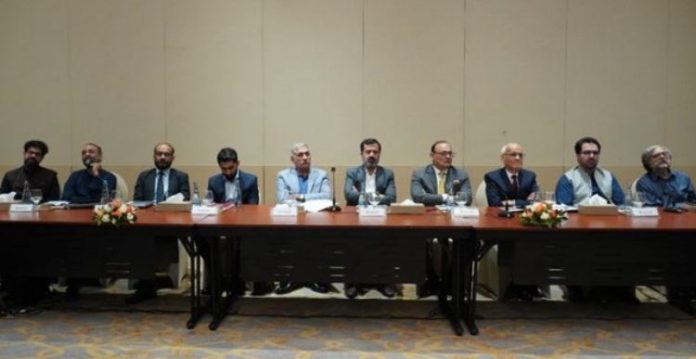ISLAMABAD, SEP 26 (APP/DNA): Experts and speakers at a consultative dialogue said that Pakistan’s recently introduced draft Indicative Generation Capacity Expansion Plan (IGCEP) and Transmission System Expansion Plan (TSEP) 2025-35 need to be more inclusive, transparent, and participatory, ensuring ownership by all the federating units so that an equitable, just and people-centric power sector planning can made and implemented.
The dialogue, titled “Critical Analysis of IGCEP and TSEP 2025-35: Inclusive Planning for a Just Energy Transition”, was organized by the Pakistan Renewable Energy Coalition (PREC) and the Alliance for Climate Justice and Clean Energy (ACJCE) here, said a press release issued on Friday.
The event brought together representatives of the federal and provincial governments, policymakers, civil society and research organizations, industry representatives, and energy investors.
Speaking at the event, Zeeshan Ashfaq, Chief Executive Officer of the Renewables First, a think-tank based in Islamabad, explained that IGCEP formulation process marked a shift from decades of ad-hocism to a formal and evidence-based planning process. While highlighting the key indicators of the successive iterations of IGCEP, he mentioned that the main purpose of power system planning is to meet the power and energy demand while also ensuring the energy system reliability at the least possible cost. He said the main critique on most IGCEP versions is that these have often violated their own foundational premise that only those power projects would be endorsed that fulfilled the least cost criterion. “Overtime, however, the quantum of pre-committed projects has decreased in IGCEP which is a positive development,” he said.
Criticizing the technical framework of IGCEP, SDPI’s energy economy expert Dr Khalid Waleed said that IGCEP 2025 relied excessively on top-down econometric models, ignoring massive solarisation being done by people on their own and electric vehicle projections given in a newly released policy while also treating battery energy storage systems narrowly. He also said that the plan overlooked climatic impacts on hydropower projects, failed to assess tariff implications of the projects included in it, and did not account for the European Union’s carbon border adjustment mechanism, which could undermine Pakistan’s industrial competitiveness.
Zain Moulvi, Research Director at the Alternative Law Collective (ALC) and member of the Alliance for Climate Justice and Clean Energy (ACJCE), argued that the plan overestimated GDP growth, ignoring Pakistan’s recent economic and demand trends. He criticized it for failing to account for ongoing floods and lacking climate and disaster stress testing. Zain also noted that the IGCEP disregards key policy measures under IMF commitments, which could significantly influence sectoral demand and investment. He emphasized that both the IGCEP and TSEP undervalue distributed generation, overlooking its least-cost potential in enabling community-based solutions like mini-grids and localized renewables. According to him, the draft plans lack transparency, especially in how transmission costs are allocated and how committed and strategic projects are assessed. He warned that the continued push for expensive and ecologically risky hydropower, combined with the arbitrary top down reshuffling of the committed project pool, risks undermining the authority of Council of Common Interests (CCI) and could lead to legal disputes.
Mr. Badar Alam, Chief Executive Officer (CEO) of the Policy Research Institute for Equitable Development (PRIED), noted that electricity is not merely a technical or financial issue, but a question of people’s rights, equity, and least-cost principles, which have often been violated in past plans. He stressed that any power sector development plan should put people’s needs and concerns at the center of energy sector development.
Dr Fiaz Chaudhry, Chairman of National Grid Company and Senior Advisor at Lahore University of Management Sciences, said though imperfect, IGCEP 2025 is a progressive step towards energy reforms. He said that least-cost planning principles allowed for meeting the same energy demand with $17 billion less investment compared to earlier estimates. He highlighted ambiguities in the past regulations and assured that stakeholder feedback would be incorporated into the final plan.

















